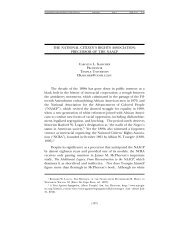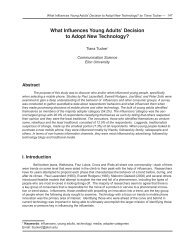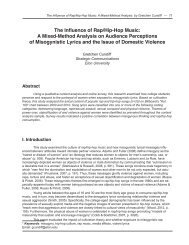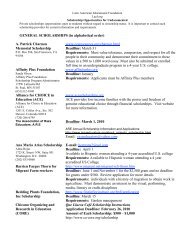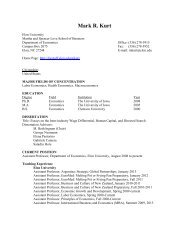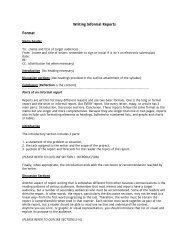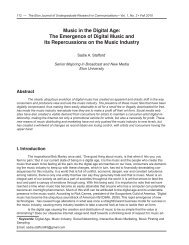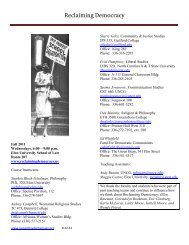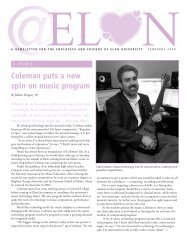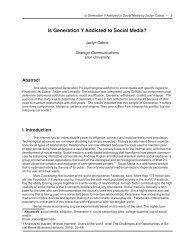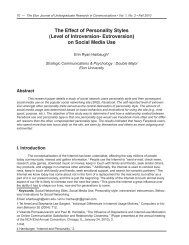In the Supreme Court of the United States In the Supreme Court of ...
In the Supreme Court of the United States In the Supreme Court of ...
In the Supreme Court of the United States In the Supreme Court of ...
You also want an ePaper? Increase the reach of your titles
YUMPU automatically turns print PDFs into web optimized ePapers that Google loves.
District <strong>Court</strong> sentences are reviewed for reasonableness under <strong>the</strong> abuse <strong>of</strong> discretion<br />
standard. Gall v. <strong>United</strong> <strong>States</strong>, 552 U.S. 38, 51 (2007). Whe<strong>the</strong>r an <strong>of</strong>fense is a violent felony<br />
under <strong>the</strong> ACCA, however, is reviewed de novo. <strong>United</strong> <strong>States</strong> v. Robinson, 583 F.3d 1292,<br />
1294 (11th Cir. 2009).<br />
ARGUMENT<br />
The Government faces <strong>the</strong> extraordinary burden <strong>of</strong> protecting its citizens from present<br />
and future danger. Both protective sweeps and <strong>the</strong> Armed Career Criminal Act (ACCA) serve<br />
this essential government function. Protective sweeps allow law enforcement <strong>of</strong>ficers to dispel<br />
threats <strong>of</strong> present danger. The ACCA prevents future harm by incarcerating certain repeat<br />
<strong>of</strong>fenders. This <strong>Court</strong> should affirm <strong>the</strong> Thirteenth Circuit’s denial <strong>of</strong> <strong>the</strong> Convict’s motion to<br />
suppress and hold that non-arrest protective sweeps are reasonable because <strong>the</strong>se limited<br />
encounters protect both citizens and <strong>of</strong>ficers. This <strong>Court</strong> should also reverse <strong>the</strong> Thirteenth<br />
Circuit’s sentence and hold that possession <strong>of</strong> an unregistered sawed-<strong>of</strong>f shotgun is a violent<br />
felony under <strong>the</strong> ACCA because it indicates <strong>the</strong> possessor is likely to cause future harm.<br />
I. The Thirteenth Circuit correctly denied <strong>the</strong> Convict’s motion, as a matter <strong>of</strong> law,<br />
because <strong>of</strong>ficers should be permitted to perform protective sweeps when <strong>the</strong> <strong>of</strong>ficer<br />
is legally on <strong>the</strong> premises and has reasonable suspicion <strong>of</strong> an unknown danger.<br />
The Fourth Amendment only prohibits “unreasonable searches and seizures.” U.S.<br />
Const. amend. IV. It is not, <strong>the</strong>refore, “a guarantee against all searches and seizures.” <strong>United</strong><br />
<strong>States</strong> v. Sharp, 470 U.S. 675, 682 (1985). When evaluating <strong>the</strong> reasonableness <strong>of</strong> a search, this<br />
<strong>Court</strong> considers <strong>the</strong> nature and circumstances <strong>of</strong> <strong>the</strong> Fourth Amendment intrusion, <strong>United</strong> <strong>States</strong><br />
v. Montoya de Hernandez, 473 U.S. 531, 537 (1985), and balances <strong>the</strong> intrusion against<br />
“legitimate government interests,” Delaware v. Frouse, 440 U.S. 648, 554 (1979). This<br />
reasonableness standard is “flexible.” Wilson v. Arkansas, 514 U.S. 927, 934 (1995).<br />
7



